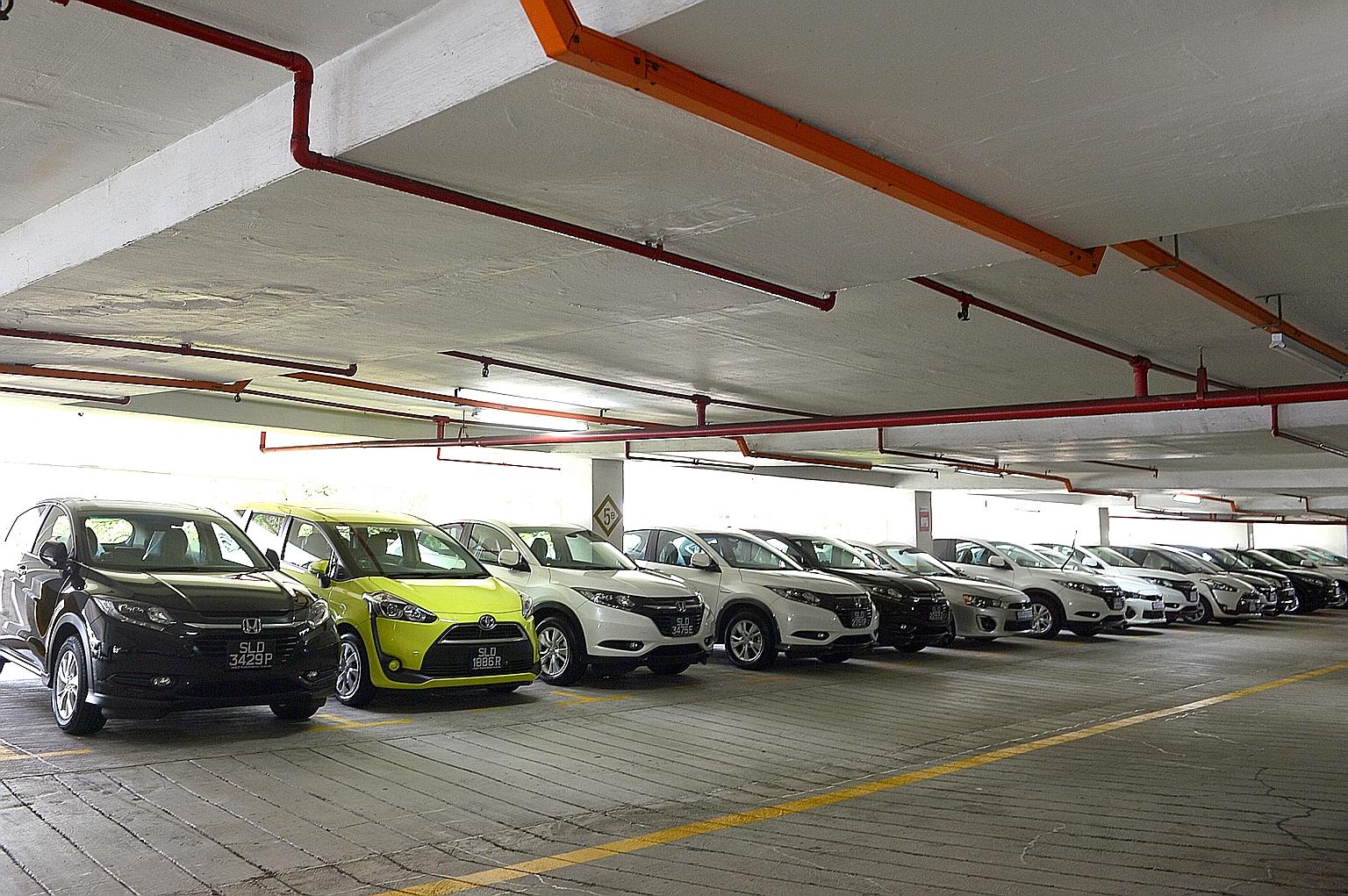Ride-hailing apps drive surge in rental cars
Sign up now: Get ST's newsletters delivered to your inbox

Private-hire cars at a multi-storey carpark near Beach Road on Wednesday. The number of such cars, used for picking up paying fares, is catching up with the total number of taxis owned by cab firms.
ST PHOTO: JAMIE KOH
The private-hire car market has surged in the last year and a half, powered by ride-hailing apps like Uber and Grab, and looks set to grow even more.
The number of rental cars has nearly doubled from 18,847 at the start of last year to 36,002 by the end of last month, according to Land Transport Authority (LTA) figures. The big jump is twice the total growth of the preceding five years.
Besides Uber and Grab, others that have jumped onto the bandwagon, such as taxi operators SMRT and Prime, as well as motor distributor Tan Chong, have also added to the expansion.
Such companies account for an estimated 21,000 or 60 per cent of the total rental car population.
Private-hire vehicles are increasingly seen by commuters and drivers as a viable alternative to taxis. The 21,000 or so rental cars used for picking up paying fares is quickly catching up with the total number of taxis owned by cab firms - 28,211.
This is 2 per cent fewer cabs than two years ago. Industry players said the number of cabs being hired out has fallen more sharply.
The sizzling popularity of private-hire vehicles has prompted players to bid aggressively for certificates of entitlement (COEs).
Before LTA blocked free access to bidders' information last week, The Straits Times found that Uber-owned Lion City Rental alone had secured nearly 2,000 COEs in just two months.
Several of the newly registered cars awaiting drivers were spotted in a multi-storey carpark near Beach Road this week. These were mainly Toyotas, Hondas and Mitsubishis bought from authorised dealers as well as parallel importers.
Uber was not reachable for comment, but head of Grab Singapore Lim Kell Jay said yesterday that "the private-hire car industry will continue to grow" as there are not enough taxis to meet peak demand.
Mirroring Uber's strategy in targeting those who want to defray the cost of motoring, Mr Lim said Grab is also "driving initiatives to reduce the cost of car ownership by enabling our drivers to have access to affordable rental cars for personal and commercial use".
The incumbents are not thrilled by these "disruptors", though.
Vehicle Rental Association secretary Jivin Tan said Uber and the like are attracting mainly people who normally would not be able to afford a car. The National Private Hire Vehicles Association estimates there are only 6,000 to 8,000 private-hire drivers here. Hence, Mr Tan said many private-hire cars will end up being primarily for personal use, and commuters are unlikely to be served well.
National Taxi Association (NTA) executive adviser Ang Hin Kee believes taxi operators will have to up the ante to compete. He said: "Taxis with their transparent pricing, rigorous regime and wide coverage are an attractive option. A level playing field will enable them to remain the choice of commuters."
In April, the Government announced that private-hire drivers will be subject to medical and background screenings. They will have to attain a vocational licence through a course and be put under a demerit point system.
Some of the NTA's recommendations were rejected, such as having uniform service quality standards for both sides.
But even as more rental fleet owners join Uber and Grab, some prefer not to. Mr Vincent Tan, general manager of RMG Rent-A-Car, said: "The mileage of these cars will be very high, so maintenance cost will be high. We would also have to pay more for insurance."


